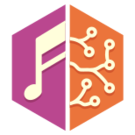About: Difference between revisions
(- TRMs (Imported from MoinMoin)) |
Silentbird (talk | contribs) (Replace with SVG) |
||
| (27 intermediate revisions by 10 users not shown) | |||
| Line 1: | Line 1: | ||
{| border="0" |
|||
| [[File:MusicBrainz logo 2016.svg|135px|link=]] |
|||
| style="padding-left: 20px;" | |
|||
'''MusicBrainz is a community-maintained open source encyclopedia of music information. |
|||
This means that anyone - including you - can [[How To Contribute|help contribute]] to the project by adding information about your favorite artists and their related works. |
|||
==Corporate Parent== |
|||
In 2000, Gracenote took over the free CDDB project and commercialized it, essentially charging users for access to the very data they had themselves contributed. In response, Robert Kaye founded MusicBrainz. The project has since grown rapidly from a one-man operation to an international community of enthusiasts who appreciate both music and music metadata. Along the way, the scope of the project has expanded from its origins as a mere a CDDB replacement to today, where MusicBrainz has become a true encyclopedia of music. |
|||
[[MusicBrainz]] is a project of the US non-profit [http://metabrainz.org MetaBrainz Foundation]. See [[MusicBrainz History|MusicBrainzHistory]] for a brief description how the MusicBrainz service has grown into its current size. |
|||
As an encyclopedia and as a community, MusicBrainz exists solely to collect as much information about music as we can. We do not discriminate or prefer one "type" of music over another though, in fact we collect information about as many different types of music as possible. Whether it is published/unpublished, popular/fringe, western/non-western, human/non-human - we want it all to be entered into MusicBrainz. |
|||
| ⚫ | |||
|} |
|||
| ⚫ | |||
'''MusicBrainz is a user-maintained community music metadatabase.''' Music metadata is information such as the [[Artist|artist name]], the [[Release Title|release title]], and the list of [[Track|tracks]] that appear on a [[Release|release]]. MusicBrainz collects this information about recordings and makes it available to the public. The web site is the interface which allows the creation and maintenance of the data. All of the data in MusicBrainz is user contributed and user maintained. This means that if you spot a mistake in the database, you should take the initiative to [http://www.musicbrainz.org/login.html create yourself a MusicBrainz account] (for free, of course!) and edit the data. MusicBrainz will never share your personal information with anyone and we will not spam you with anything. We believe strongly in the privacy of our users and since they are our lifeblood we would be stupid to disrespect our contributors. Please contribute your knowledge about music and MusicBrainz will share your knowledge with others, and in time MusicBrainz can become the most powerful and comprehensive music service in existence. In return for your hard work, MusicBrainz makes the data that users have contributed to [[Database Download|available for download]] to the public. Some portions of the data are placed into the [http://creativecommons.org/licenses/publicdomain Public Domain] and some portions are covered by a [[Creative Commons|CreativeCommons]] [http://creativecommons.org/licenses/by-nc-sa/1.0 license]. Please take a look at our [[Server]] / [[Database]] product pages. |
|||
The [[MusicBrainz Database]] is where all of the various pieces of information we collect about music are stored, from artists and their releases to works and their composers, and much more. '''Note:''' We do not actually store or have access to any of the music recordings! |
|||
'''The MusicBrainz products:''' MusicBrainz takes the catalog service one step further and provides products which build on it. Our products can be used to apply the data to digital audio files like MP3, Ogg Vorbis (and for the [[Picard Tagger|PicardTagger]], a multitude of other digital audio formats as well). The metadata contained in these files is often incorrect or missing altogether. If this data is not present or incorrect, even more since many music lovers have a huge collection of digital audio files, it is very hard to find the music one wants to listen to. The MusicBrainz solutions for this are the [[MusicBrainz Tagger|legacy windows-only tagger]], iEatBrainz, and the new cross-platform [[Picard Tagger|PicardTagger]] - Windows, MacOS X, and Python applications that use [[Acoustic Fingerprint|AcousticFingerprint]]<code><nowiki></nowiki></code>s ([[PUID]]s) to semi-automatically identify tracks in your music collection and then write consistent and accurate metadata to your digital audio files. MusicBrainz provides a [[XML Web Service|webservice]] which can be used to query musicbrainz data from any application which is able to parse XML. Another option is [[MusicBrainz Server Setup|to setup an own copy of the MusicBrainz server]], and import the latest database dump. From there on, you can subscribe to the [[Replication Mechanics|database replication service]] (free for non-commerical use!) which allows your copy of the database to stay up-to-date with the changes being made to the main database. (see the [[Products|products page]] for more details) |
|||
The majority of the data in the [[MusicBrainz Database]] is licensed under the [http://creativecommons.org/publicdomain/zero/1.0/ CC0], which is effectively placing the data into the Public Domain. That means that anyone can [[MusicBrainz Database/Download|download the data]] and use it in any way they see fit. The remaining data is released under a Creative Commons [http://creativecommons.org/licenses/by-nc-sa/3.0/ Attribution-NonCommercial-ShareAlike 3.0] license. |
|||
'''MusicBrainz provides data about recordings, but ''not'' the media files itself:''' The MusicBrainz service only provides the data ''about'' music (a catalog of music [http://en.wikipedia.org/wiki/Metadata metadata]) but '''not the music itself'''. MusicBrainz does not condone copyright infringement and will never help you find a place to illegally download copyrighted works. |
|||
All of our data is available for commercial licensing. If you are interested in licensing this data for commercial use, please [[Contact Us|contact us]]. |
|||
'''How the MusicBrainz catalog can be used:''' MusicBrainz users can browse and search our catalog to examine what music different artists have published and how those artists relate to each other, to discover new music. The music metadata and its ability to uniquely identify music will also enable non-ambiguous communication about music, and will allow the Internet community to discover new music without any of the bias introduced by marketing departments of the recording industry. Another usage scenario is the lookup of information by media players: Since most audio CDs do not contain the metadata about the recording on the physical media, but they can use the digital characteristics of the CD (i.e. number of tracks, the length of the tracks) to look up the metadata and use this information to enhance the listening experience. |
|||
== What can I do with MusicBrainz? == |
|||
'''Where to go from here:''' This introduction serves as the most basic crash course on what MusicBrainz does. The MusicBrainz project has many goals for the future with the hopes of changing how people enjoy their music collections. The detailed [[Current Work|current status]], the [[Future Work|plans for the future]], our views on working with commercial companies and our plans for creating a non-profit corporation are covered in great detail in our [http://www.musicbrainz.org/papers/mb_nonprofit.html MusicBrainz Non-Profit White Paper]. |
|||
If you have a digital music collection, [[MusicBrainz Picard]] will help you tag your files. |
|||
With this short introduction, we leave you to explore MusicBrainz. Welcome, and enjoy your visit! |
|||
If you are a developer, our [[Developer Resources|developer resources]] will assist you in making use of our data. |
|||
[[Category:To Be Reviewed]] [[Category:WikiDocs Page]] [[Category:Philosophy]] |
|||
If you are a commercial user, our [[Live Data Feed|live data feed]] will provide your local database with replication packets to keep it in sync. |
|||
== MetaBrainz Foundation == |
|||
{| border="0" |
|||
| [[Image:MeBnt.png|135px|link=]] |
|||
| style="padding-left: 20px;" | |
|||
MusicBrainz is operated by the [http://metabrainz.org MetaBrainz Foundation], a California based 501(c)(3) tax-exempt non-profit corporation dedicated to keeping MusicBrainz free and open source. |
|||
If you feel that MusicBrainz is a worthwhile effort, please consider [http://metabrainz.org/donate making a donation] to help support further growth and development. |
|||
|} |
|||
__NOTOC__ |
|||
__NOEDITSECTION__ |
|||
[[Category:WikiDocs Page]] |
|||
Revision as of 07:52, 3 January 2018

|
MusicBrainz is a community-maintained open source encyclopedia of music information. This means that anyone - including you - can help contribute to the project by adding information about your favorite artists and their related works. In 2000, Gracenote took over the free CDDB project and commercialized it, essentially charging users for access to the very data they had themselves contributed. In response, Robert Kaye founded MusicBrainz. The project has since grown rapidly from a one-man operation to an international community of enthusiasts who appreciate both music and music metadata. Along the way, the scope of the project has expanded from its origins as a mere a CDDB replacement to today, where MusicBrainz has become a true encyclopedia of music. As an encyclopedia and as a community, MusicBrainz exists solely to collect as much information about music as we can. We do not discriminate or prefer one "type" of music over another though, in fact we collect information about as many different types of music as possible. Whether it is published/unpublished, popular/fringe, western/non-western, human/non-human - we want it all to be entered into MusicBrainz. |
MusicBrainz Database
The MusicBrainz Database is where all of the various pieces of information we collect about music are stored, from artists and their releases to works and their composers, and much more. Note: We do not actually store or have access to any of the music recordings!
The majority of the data in the MusicBrainz Database is licensed under the CC0, which is effectively placing the data into the Public Domain. That means that anyone can download the data and use it in any way they see fit. The remaining data is released under a Creative Commons Attribution-NonCommercial-ShareAlike 3.0 license.
All of our data is available for commercial licensing. If you are interested in licensing this data for commercial use, please contact us.
What can I do with MusicBrainz?
If you have a digital music collection, MusicBrainz Picard will help you tag your files.
If you are a developer, our developer resources will assist you in making use of our data.
If you are a commercial user, our live data feed will provide your local database with replication packets to keep it in sync.
MetaBrainz Foundation

|
MusicBrainz is operated by the MetaBrainz Foundation, a California based 501(c)(3) tax-exempt non-profit corporation dedicated to keeping MusicBrainz free and open source. If you feel that MusicBrainz is a worthwhile effort, please consider making a donation to help support further growth and development. |